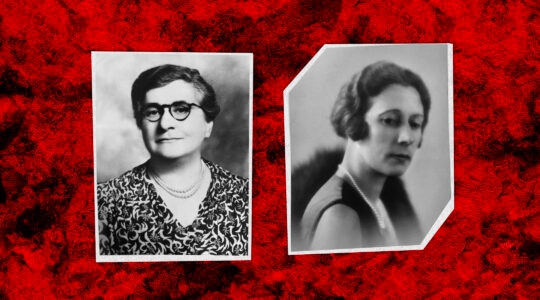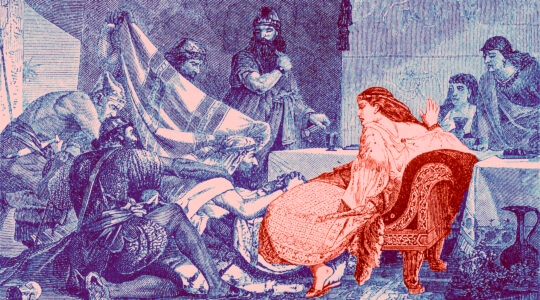LOS ANGELES (JTA) – For Americans, but especially for Jews, 2008 will be a pivotal presidential election. Buffeted by the emergence of new global threats directed against Israel, Judaism and the Jewish people, Jews again are focusing on the presidency as the one institution pivotal to its security.
Jewish voting patterns over the past 75 years have tended to be fixed, especially in recent presidential elections, with the Democrat winning 75-80 percent. Despite the fact that Jews have been aligned heavily with the Democratic Party certainly throughout much of the 20th century, November’s presidential contest has raised some challenging options and interesting possibilities.
Selectively during the past three decades, Republican presidential candidates have created inroads into the Democratic Jewish voting bloc. Ronald Reagan did so in 1980, garnering 38 percent of the Jewish vote, while President George H.W. Bush secured more than 30 percent in his 1988 campaign. The current President Bush raised his total from 19 percent of the Jewish vote in 2000 to 25 percent in 2004.
Generally, in periods of high economic or social anxiety, voters tend to return to their traditional base; for Jews this would normally be the Democratic nominee. Due to a number of elements, however, the Jewish vote is likely to be even more contested than in recent elections. Current polling already suggests such a trend, with U.S. Sen. Barack Obama (D-Ill.) hovering at about 60 percent of the Jewish vote. A shift of even 20 percent of the Jewish vote rather than the normal 10-12 percent could have an impact on the outcome of this year’s election. In highly contested swing states with significant Jewish voting populations, including Florida, Pennsylvania, and Ohio, such a scenario is very possible.
Among the factors that may impact how Jews approach the presidential sweepstakes: a possible recession at home, an unpopular war abroad, and a level of unease about the demise of America’s economic and political standing in the world. Also at play is the apparent emergence of two camps: Red State and Blue State Jews.
Red and Blue States
The candidacy of Sen. John McCain (R-Ariz.) may represent for a significant element of Jewish voters a type of stabilizing influence that could challenge the historically strong connection of the Jewish voter to the Democratic Party. Unlike President Bush at the start of the 2000 campaign, McCain has had a long connection with the pro-Israel community that will enable this Republican to do particularly well with specific Jewish constituencies, especially the new class of Red State Jewish voters that emerged during the past eight years.
As this label suggests, such voters take on some of the electoral characteristics of core Republicans. Primarily concerned with Israel’s security, this cohort of voters embraces the current president’s commitments to Israel and support the continuation of a strong U.S. military and diplomatic focus within the Middle East designed to contain the growing influence and threat of Iran and its allies. Some in this camp represent neo-conservatives who over time have embraced the president’s policies in the region in dealing with Iraq and in supporting Israel’s actions in Lebanon in 2006 but now involve other adherents to such a particular political focus.
This segment of voters believes the rise of global anti-Semitism and the case for Israel as central elements in defining their political orientation at this time. A particular component of McCain’s support among Jewish voters appears to represent an element of the voting bloc who has articulated strong reservations and concerns regarding the Obama candidacy.
Yet McCain faces a series of challenges. His support for overturning Roe v. Wade, his health-care proposals and other domestic positions have meant with opposition among key Jewish constituencies. Even when it comes to foreign policy, polls show, the bulk of American Jews reject the major elements of the foreign policy advanced by the Bush administration and backed by McCain, most notably the Iraq war.
Blue State Jewish voters represent those individuals who approach their political choices through the lens of a multi-issue agenda, encompassing a woman’s right of choice, an aggressive environmental policy, gay rights, and other selective social and public policy concerns. One element of this Jewish voting sector is comprised of a growing segment of voters described as “the gentry liberals” who are the primary beneficiaries of both globalization and the financial investment markets.
Residing in a number of this nation’s wealthiest congressional districts, they live in and around New York, Boston, Washington, San Francisco and West Los Angeles.
The presence of this new constituency can be seen in their active participation in MoveOn.org and the Huffington Post, and in turn through their support of specific Jewish progressive and environmental priorities. According to polling data and funding sources, many of these Blue State Jews were early supporters of the Obama campaign.
Obama may represent a fundamentally different type of American politician, as he draws upon his organizing instincts, the influence within his life of religious and cultural values, the rhetoric and style of the black church, and his sense of American politics and history. This specific phenomenon appeals to a particular type of Jewish liberal instinct, especially for those Jews who are ideologically driven, having either grown up in political or social “movements” themselves or whose family roots are tied to the culture of the labor union tradition. His focus on community-organizing themes and principles resonates to their connections to the labor movement and to an array of social causes.
A second factor involves the candidate himself, as Obama represents a new cosmopolitan generation of leadership, someone who is well educated, articulate and with a diverse set of life experiences. As a result, he appeals to an intellectual class of Jewish voters.
The “gentrified liberal” sector of the emerging new Jewish class of wealthy technologists and business entrepreneurs find both Obama’s style and message in concert with their own social values and political instincts, and correspondingly they have rallied to his campaign, offering their resources and their votes. Similarly, Obama for some reflects the continuation of the traditional anti-war/anti-establishment faction within American politics, thus his rhetoric also appeals to this element within the Jewish community.
A significant sector of Jewish voters across this nation identified with the Obama candidacy. In many of the most liberal districts with high density Jewish populations, Obama outpolled Hillary Clinton in primaries over the course of the past several months. In Massachusetts, for example, Obama received more than 50 percent of the Jewish vote, while in Connecticut he took six of every 10 Jewish votes. Among Jewish voters in California, he defeated Clinton by receiving 49 percent of their support to her 47 percent, and similar figures have appeared in other states, including Maryland.
Some Jews when asked about the Obama message report that his ideas portray for them a “prophetic calling” sparking in their consciousness a link to their own Jewish social justice imperative. The supporters of former presidential candidate John Edwards have expressed how easy the transition has been for them into the Obama camp in light of the latter’s attention to the re-envisioning of social service programs, alternative energy initiatives and health-care priorities. Obama’s older Jewish supporters recall the parallels to Robert Kennedy as offered by the Obama mystique.
Despite the appeal of Obama in certain Jewish quarters, there is a countervailing force within the Jewish community as a result of the revelations involving the political views of his former pastor, the Rev. Jeremiah Wright, and the failure of the candidate to repudiate and step away earlier from his association with Trinity United Church of Christ.
Similarly, Republican efforts to paint him as an unreliable supporter of Israel surrounded by unsympathetic Middle East policy advisers and his publicly expressed willingness to hold direct negotiations with the leader of Iran also have hurt Obama’s standing within certain Jewish circles.
With Clinton’s withdrawal from the race and his decision to tap someone else as his running mate, Obama faces yet an additional challenge in capturing her supporters.
Looking ahead
Since the 2004 presidential campaign, it is possible to identify a number of significant political and social trends that may impact and possibly alter the Jewish vote in this year’s presidential race. While a solid majority of Jews remains in the Democratic fold, their voting patterns and political inclinations seem to reflect an array of policy interests and represent a changing set of priorities.
Demographic changes within the Jewish community itself add to this new complexity. The emergence of a growing segment of new American Jewish voters includes recent emigres from Russia, Israel and Iran, and the coming of age of a younger cohort of Orthodox Jewish voters. All of these constituencies are increasingly aligned with the Republican Party.
With reference to generational voting, Jews born prior to 1945 identify in higher numbers with the Democratic Party than do baby boomers, those born between 1946 and 1964, and Gen. Xers and Yers, those born between 1965 and 1983. Fifty-five percent of the pre-1945 cohort identifies with the Democrats and 15 percent with the Republicans. Identification with the Democrats drops to 43 percent in the case of the younger cohorts.
One of the primary characteristics of Jewish voters wherever they are found on the political spectrum is that as a group there is an overwhelming negative reaction to mismanagement, scandal or the absence of effective leadership. The lack of competency is a value shared with other key constituencies. The current disgust with government has been a significant contributor to the growth of a significant segment of Jewish voters who describe themselves today as “independent.” Today, a third of all Jews consider themselves to be independent voters.
With the selections of the respective vice-presidential candidates, another significant dimension has been added to this election cycle. Senator Biden’s candidacy is designed in part to galvanize at least elements of Hillary Clinton’s Jewish base and to strengthen the Democratic ticket’s foreign policy credentials.
Governor Palin is the unknown equation. Despite her conservative positions on many domestic issues, she may help solidify Jewish support for McCain as a result of her hawkish foreign policy views among Jewish voters in the red states. For more liberal Jewish voters, Palin’s candidacy will serve to solidify support for the Obama ticket.
Again “the Jewish vote” will be in play for the forthcoming national elections, in part due to the high turnout exhibited by this body of voters. As in the past, there will be a heightened level of interest by Jews in the presidential campaign and, in turn, the Jewish voter will receive a significant amount of attention as candidates seek to appeal to the various emerging and diverse constituencies that now comprise this community.
(Dr. Steven Windmueller is the dean of the Hebrew Union College-Jewish Institute of Religion in Los Angeles and adjunct professor of Jewish communal studies.)
JTA has documented Jewish history in real-time for over a century. Keep our journalism strong by joining us in supporting independent, award-winning reporting.





